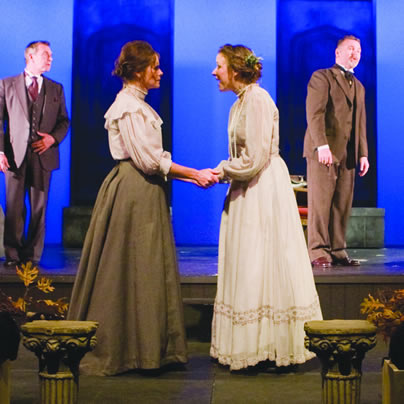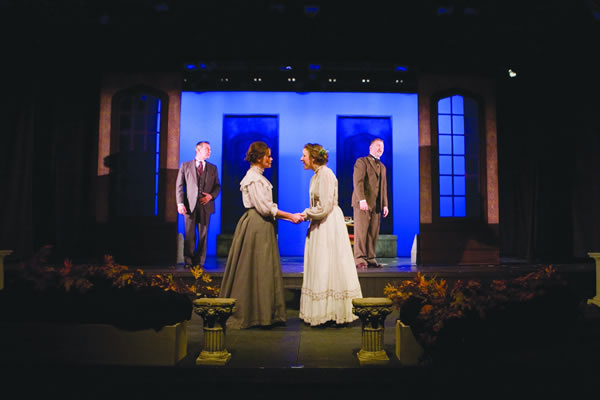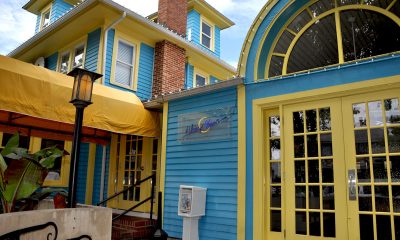Arts & Entertainment
Broadway at the beach
Clear Space provides theater fix for Rehoboth visitors all summer

Rehoboth Clear Space Theatre
20 Baltimore Ave.
Rehoboth Beach, Del.
Show times depend on the week

A scene from one of last year’s plays at Rehoboth Clear Space Theatre. (Photos courtesy the theater)
General admission is $30, senior citizens are $25 and students are $15
For many theaters, summer is the slowest time of year as families escape the city heat for the cooler shore. But for Clear Space Theatre in Rehoboth Beach, the influx of tourists keeps the theater teeming with people finding alternative ways to spend a summer night at the beach.
The theater gets so busy that this year its management is running three different shows at once in rotation. This year’s shows, which each cost between $8,000 and $25,000 to produce, include, “Cabaret,” “Broadway at the Beach” and “Annie.”
“Our seasons tend to appeal to a variety of tastes,” says Doug Yetter, founder and musical director. “For the summer season, we offer a family musical (“Annie”), a more adult-themed show (“Cabaret”) and a revue show that bridges the gap.”
“Annie,” opened June 30 and is the famous musical about a little orphan girl who goes on adventures in her orphanage and eventually around New York City, ingratiating herself with the president and finding a home in the Warbucks’ mansion.
“Cabaret” opened June 28 and is the more mature show being performed at Clear Space. Taking place in the Kit Kat Klub in Nazi Germany, American writer Cliff falls for a Klub performer named Sally Bowles. The play observes how they try to make their love survive in a changing world.
“Broadway at the Beach” opened this week and brings several Broadway hit songs to the shores of Delaware.
All shows run until September with “Broadway at the Beach” closing the season on Sept. 2.
Despite the schedule — each show is performed at least once a week — changing sets hasn’t been a problem.
“When my former partner and I were thinking to move down here, we thought we need to clear some space,” Yetter says. “We don’t need great sets for this; we let the audience bring their imagination.”
Yetter and his former partner co-founded Clear Space Theatre when they moved to Rehoboth Beach from New York City in 2004. Yetter says they thought the community would “benefit both culturally and economically from having a year-round theater.”
Yetter had about 40 years of musical theater experience, putting on productions all over the country. At Clear Space he works largely as artistic and musical director, overseeing all productions.
Since there’s not a strong emphasis on the sets for these shows, the costumes and characters have to carry the productions. Bill Clark, the full-time costume designer, immerses himself in the various stories to dress the cast appropriately.
“When we choose the shows we’re going to do three months out from our first creative meeting, I read the scripts three times,” he says. “Then I create a costume plot, detailed scenes that serve as a map, and from there I sketch individual costumes.”
For Clark’s favorite costumes in “Cabaret,” he began studying the culture in Berlin from 1925 onward. He also studied the works by Christopher Isherwood, a gay novelist from the 1930s, who wrote the original story upon which “Cabaret” is based, trying to reflect its dark tones in the clothes the Kit Kat Klub girls don.
“I’ve put the girls in some vintage lingerie from that era with a corset pattern,” he says.
Compared to other renditions of “Cabaret,” director Dorothy Neuman says her version may appear darker.
“It’s very topical,” she says. “A force in the government, the Nazis who are coming to power, have certain prejudices in society. They consider that they have the right answer. I feel this is a very parallel situation in America, a very strong conservative right in which they think they know what is morally right and if you don’t agree with them then you are not American.”
Neuman, who identifies as a “woman who happens to be gay,” has been directing theater since 1978, starting in various places in Arlington, Va., and Washington.
Michael Matthias, who is acting in all three productions, says that he’s looking forward to “Cabaret” mostly because of its darker overtones. He also says staging three shows is made easier because they are working with mostly the same company all year round.
“We are considered a professional theater because we have a year-round theater company,” he says. “The theater holds auditions for roles not filled by the company.”
As part of the company, he’s expected to continue his growth as an actor by attending classes. This season, he plays Rooster Hannigan in “Annie,” he’s part of the ensemble in “Broadway at the Beach” and also Cliff in “Cabaret.”
Chris Poeschl, an actor brought in for the summer, says Clear Space Theatre is different from most venues where he’s performed.
“It’s such an intimate experience, when we are out on the stage we are in the audience,” he says.
Poeschl is in the ensemble for “Broadway at the Beach,” but is excited for all three productions. None of the plays are LGBT-specific, though “Cabaret,” of course, has long been a gay favorite.
“‘Cabaret’ in our theater is handled very maturely, very real,” he says. “It’s a reliable description.”
Because of the large LGBT population in Rehoboth, Yetter says he makes it a point to include shows with gay appeal.
“We really serve the community,” he says. “It’s important that we have pieces that are inclusive.”
Bob Hoffer and Max Dick, who have been attending performances at Clear Space for the past five years, say the small, tight-knit community of the theater draws in many Rehoboth gay residents and visitors.
“There are a lot of gay and lesbian people involved in the theater,” Hoffer says. “Often you will run into a lot of cast members in the restaurants and bars around the theater. Going to the theater gives you a kind of perk in your day.”

Friday, Feb. 20
Center Aging Monthly Luncheon with Yoga will be at noon at the D.C. LGBTQ+ Community Center. Email Mac at [email protected] if you require ASL interpreter assistance, have any dietary restrictions, or questions about this event.
Trans and Genderqueer Game Night will be at 7 p.m. at the D.C. Center. This will be a relaxing, laid-back evening of games and fun. All are welcome! We’ll have card and board games on hand. Feel free to bring your own games to share. For more details, visit the Center’s website.
Go Gay DC will host “First Friday LGBTQ+ Community Social” at 7 p.m. at Hotel Zena. This is a chance to relax, make new friends, and enjoy happy hour specials at this classic retro venue. Attendance is free and more details are available on Eventbrite.
Saturday, Feb. 21
Go Gay DC will host “LGBTQ+ Community Brunch” at 11 a.m. at Freddie’s Beach Bar & Restaurant. This fun weekly event brings the DMV area LGBTQ community, including allies, together for delicious food and conversation. Attendance is free and more details are available on Eventbrite.
LGBTQ People of Color will be at 7 p.m. on Zoom. This peer support group is an outlet for LGBTQ People of Color to come together and talk about anything affecting them in a space that strives to be safe and judgement free. There are all sorts of activities like watching movies, poetry events, storytelling, and just hanging out with others. For more information and events, visit thedccenter.org/poc or facebook.com/centerpoc.
Sunday, Feb. 22
Queer Talk DC will host “The Black Gay Flea Market” at 1 p.m. at Doubles in Petworth. There will be more than 15 Black queer vendors from all over the DMV in one spot. The event’s organizers have reserved the large back patio for all vendors, and the speak easy for bar service, which will be serving curated cocktails made just for the event (cash bar.) DJ Fay and DJ Jam 2x will be spinning the entire event. For more details, visit Eventbrite.
Monday, Feb. 23
“Center Aging: Monday Coffee Klatch” will be at 10 a.m. on Zoom. This is a social hour for older LGBTQ adults. Guests are encouraged to bring a beverage of choice. For more information, contact Adam at [email protected].
Tuesday, Feb. 24
Coming Out Discussion Group will be at 7 p.m. on Zoom. This is a safe space to share experiences about coming out and discuss topics as it relates to doing so — by sharing struggles and victories the group allows those newly coming out and who have been out for a while to learn from others. For more details, visit the group’s Facebook.
Genderqueer DC will be at 7 p.m. on Zoom. This is a support group for people who identify outside of the gender binary, whether you’re bigender, agender, genderfluid, or just know that you’re not 100 percent cis. For more details, visit genderqueerdc.org or Facebook.
Wednesday, Feb. 25
Job Club will be at 6 p.m. on Zoom upon request. This is a weekly job support program to help job entrants and seekers, including the long-term unemployed, improve self-confidence, motivation, resilience and productivity for effective job searches and networking — allowing participants to move away from being merely “applicants” toward being “candidates.” For more information, email [email protected] or visit thedccenter.org/careers.
Asexual and Aromantic Group will meet at 7 p.m. on Zoom. This is a space where people who are questioning this aspect of their identity or those who identify as asexual and/or aromantic can come together, share stories and experiences, and discuss various topics. For more details, email [email protected].
Thursday, Feb. 26
The DC Center’s Fresh Produce Program will be held all day at the DC Center. To be more fair with who is receiving boxes, the program is moving to a lottery system. People will be informed on Wednesday at 5 p.m. if they are picked to receive a produce box. No proof of residency or income is required. For more information, email [email protected] or call 202-682-2245.
Virtual Yoga Class will be at 7 p.m. on Zoom. This free weekly class is a combination of yoga, breathwork and meditation that allows LGBTQ community members to continue their healing journey with somatic and mindfulness practices. For more details, visit the DC Center’s website.
Sports
US wins Olympic gold medal in women’s hockey
Team captain Hilary Knight proposed to girlfriend on Wednesday

The U.S. women’s hockey team on Thursday won a gold medal at the Milan Cortina Winter Olympics.
Team USA defeated Canada 2-1 in overtime. The game took place a day after Team USA captain Hilary Knight proposed to her girlfriend, Brittany Bowe, an Olympic speed skater.
Cayla Barnes and Alex Carpenter — Knight’s teammates — are also LGBTQ. They are among the more than 40 openly LGBTQ athletes who are competing in the games.
The Olympics will end on Sunday.
Movies
Radical reframing highlights the ‘Wuthering’ highs and lows of a classic
Emerald Fennell’s cinematic vision elicits strong reactions

If you’re a fan of “Wuthering Heights” — Emily Brontë’s oft-filmed 1847 novel about a doomed romance on the Yorkshire moors — it’s a given you’re going to have opinions about any new adaptation that comes along, but in the case of filmmaker Emerald Fennell’s new cinematic vision of this venerable classic, they’re probably going to be strong ones.
It’s nothing new, really. Brontë’s book has elicited controversy since its first publication, when it sparked outrage among Victorian readers over its tragic tale of thwarted lovers locked into an obsessive quest for revenge against each other, and has continued to shock generations of readers with its depictions of emotional cruelty and violent abuse, its dysfunctional relationships, and its grim portrait of a deeply-embedded class structure which perpetuates misery at every level of the social hierarchy.
It’s no wonder, then, that Fennell’s adaptation — a true “fangirl” appreciation project distinguished by the radical sensibilities which the third-time director brings to the mix — has become a flash point for social commentators whose main exposure to the tale has been flavored by decades of watered-down, romanticized “reinventions,” almost all of which omit large portions of the novel to selectively shape what’s left into a period tearjerker about star-crossed love, often distancing themselves from the raw emotional core of the story by adhering to generic tropes of “gothic romance” and rarely doing justice to the complexity of its characters — or, for that matter, its author’s deeper intentions.
Fennell’s version doesn’t exactly break that pattern; she, too, elides much of the novel’s sprawling plot to focus on the twisted entanglement between Catherine Earnshaw (Margot Robbie), daughter of the now-impoverished master of the titular estate (Martin Clunes), and Heathcliff (Jacob Elordi), a lowborn child of unknown background origin that has been “adopted” by her father as a servant in the household. Both subjected to the whims of the elder Earnshaw’s violent temper, they form a bond of mutual support in childhood which evolves, as they come of age, into something more; yet regardless of her feelings for him, Cathy — whose future status and security are at risk — chooses to marry Edgar Linton (Shazad Latif), the financially secure new owner of a neighboring estate. Heathcliff, devastated by her betrayal, leaves for parts unknown, only to return a few years later with a mysteriously-obtained fortune. Imposing himself into Cathy’s comfortable-but-joyless matrimony, he rekindles their now-forbidden passion and they become entwined in a torrid affair — even as he openly courts Linton’s naive ward Isabella (Alison Oliver) and plots to destroy the entire household from within. One might almost say that these two are the poster couple for the phrase “it’s complicated.” and it’s probably needless to say things don’t go well for anybody involved.
While there is more than enough material in “Wuthering Heights” that might easily be labeled as “problematic” in our contemporary judgments — like the fact that it’s a love story between two childhood friends, essentially raised as siblings, which becomes codependent and poisons every other relationship in their lives — the controversy over Fennell’s version has coalesced less around the content than her casting choices. When the project was announced, she drew criticism over the decision to cast Robbie (who also produced the film) opposite the younger Elordi. In the end, the casting works — though the age gap might be mildly distracting for some, both actors deliver superb performances, and the chemistry they exude soon renders it irrelevant.
Another controversy, however, is less easily dispelled. Though we never learn his true ethnic background, Brontë’s original text describes Heathcliff as having the appearance of “a dark-skinned gipsy” with “black fire” in his eyes; the character has typically been played by distinctly “Anglo” men, and consequently, many modern observers have expressed disappointment (and in some cases, full-blown outrage) over Fennel’s choice to use Elordi instead of putting an actor of color for the part, especially given the contemporary filter which she clearly chose for her interpretation for the novel.
In fact, it’s that modernized perspective — a view of history informed by social criticism, economic politics, feminist insight, and a sexual candor that would have shocked the prim Victorian readers of Brontë’s novel — that turns Fennell’s visually striking adaptation into more than just a comfortably romanticized period costume drama. From her very opening scene — a public hanging in the village where the death throes of the dangling body elicit lurid glee from the eagerly-gathered crowd — she makes it oppressively clear that the 18th-century was not a pleasant time to live; the brutality of the era is a primal force in her vision of the story, from the harrowing abuse that forges its lovers’ codependent bond, to the rigidly maintained class structure that compels even those in the higher echelons — especially women — into a kind of slavery to the system, to the inequities that fuel disloyalty among the vulnerable simply to preserve their own tenuous place in the hierarchy. It’s a battle for survival, if not of the fittest then of the most ruthless.
At the same time, she applies a distinctly 21st-century attitude of “sex-positivity” to evoke the appeal of carnality, not just for its own sake but as a taste of freedom; she even uses it to reframe Heathcliff’s cruel torment of Isabella by implying a consensual dom/sub relationship between them, offering a fragment of agency to a character typically relegated to the role of victim. Most crucially, of course, it permits Fennell to openly depict the sexuality of Cathy and Heathcliff as an experience of transgressive joy — albeit a tormented one — made perhaps even more irresistible (for them and for us) by the sense of rebellion that comes along with it.
Finally, while this “Wuthering Heights” may not have been the one to finally allow Heathcliff’s ambiguous racial identity to come to the forefront, Fennell does employ some “color-blind” casting — Latif is mixed-race (white and Pakistani) and Hong Chau, understated but profound in the crucial role of Nelly, Cathy’s longtime “paid companion,” is of Vietnamese descent — to illuminate the added pressures of being an “other” in a world weighted in favor of sameness.
Does all this contemporary hindsight into the fabric of Brontë’s epic novel make for a quintessential “Wuthering Heights?” Even allowing that such a thing were possible, probably not. While it presents a stylishly crafted and thrillingly cinematic take on this complex classic, richly enhanced by a superb and adventurous cast, it’s not likely to satisfy anyone looking for a faithful rendition, nor does it reveal a new angle from which the “romance” at its center looks anything other than toxic — indeed, it almost fetishizes the dysfunction. Even without the thorny debate around Heathcliff’s racial identity, there’s plenty here to prompt purists and revisionists alike to find fault with Fennell’s approach.
Yet for those looking for a new window into to this perennial classic, and who are comfortable with the radical flourish for which Fennell is already known, it’s an engrossing and intellectually stimulating exploration of this iconic story in a way that exchanges comfortable familiarity for unpredictable chaos — and for cinema fans, that’s more than enough reason to give “Wuthering Heights” a chance.




















